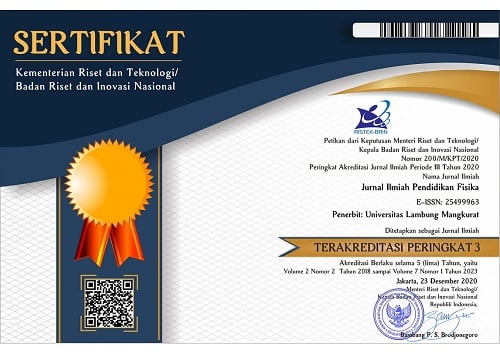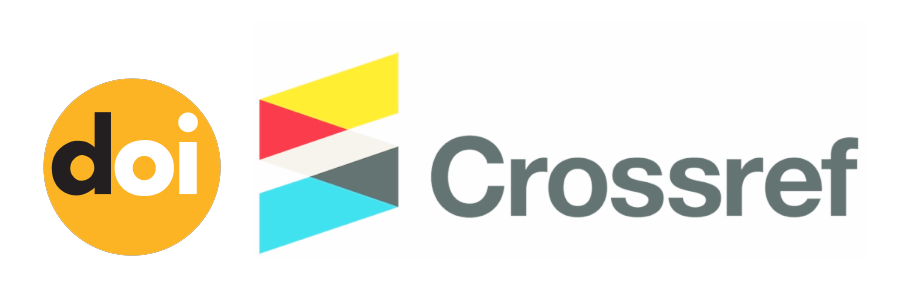Application of The Problem-Based Learning (PBL) Model Using The Education for Sustainable Development (ESD) Approach to Students' Critical Thinking Ability in Global Warming Material
Abstract
The rapid development of the Industrial Revolution 4.0 era requires humans to withstand rapid changes. Mastery of 21st-century skills and sustainability awareness becomes crucial as society in this era is required to sustain Natural Resources (NR) and develop Human Resources (HR) preparedness to adapt. Critical thinking is one of the competencies that students must possess in the 21st century and is also a key competency in ESD that can help students realize the concept of sustainability awareness in the Industrial Revolution 4.0 era. A learning model that can develop students' critical thinking skills is the PBL model because thinking and problem-solving skills can be developed when students do it themselves, explore, and transfer the complexity of existing knowledge. Therefore, this study aims to determine the application of the PBL model with an ESD approach to students' critical thinking skills on global warming material. This research uses the quantitative method of pre-experimental designs with the One Group Pre-test-posttest design. The subjects of this study were 38 students at a public high school in Bandung. The sample was taken using the convenience sampling method on 11th-grade science students in the even semester of the 2022/2023 academic year. The instruments used in this study were a critical thinking skills test and a sustainability awareness questionnaire using the Guttman scale. The data obtained were processed using the Normalized Gain (N-Gain) test for critical thinking skills and the response percentage for the sustainability awareness questionnaire. The results showed increased students' critical thinking skills N-Gain of 0.524 in the medium category. Meanwhile, the sustainability awareness questionnaire profile after learning activities showed a total percentage of 73.94% in the high category.
Keywords
Full Text:
PDFReferences
Abdul-Aziz, M., Al-Momani, I., & Khasawneh, M. (2017). The effect of the brainstorming strategy on the academic achievement of the teaching design subject for Al-Balqa University students. Journal of Sciences and Humanities, 28(1), 1-16.
Abdul-Jaleel, A. (2009). The effect of problem-centered learning strategy on generative thinking and the trend towards industrial security and occupational safety among industrial secondary school pupils. In Proceedings of the Third Annual Scientific Conference of the College of Education in Port Said (School of the Future - Reality and Hope) (Part 1). Port Said, Egypt.
Abu Zaina, F. (2011). The investigative model in thinking and problem solving (1st ed.). Amman, Jordan: Wael House.
Adinda, I. R., Hasanah, U., & Banun, S. (2022). Analisis kemampuan berpikir kritis biologi siswa saat pembelajaran daring. Jurnal Biolokus: Jurnal Penelitian Pendidikan Biologi dan Biologi, 4(2), 118-127.
Agusti, K. A., Wijaya, A. F. C., & Tarigan, D. E. (2019). Problem-based learning dengan konteks ESD untuk meningkatkan keterampilan berpikir kritis dan sustainability awareness siswa SMA pada materi pemanasan global. In Proceedings of SNF2019 (pp. PE-175–182). https://doi.org/10.21009/03.snf2019.01.pe.22
Al-Hujaili, M. (2011). The effect of teaching mathematical concepts using problem-centered learning strategy on achievement and attitude toward mathematics for new students in the mathematics department of the Teachers College in Madinah. The Journal of Reading and Knowledge, 116.
Al-Huthaifi, K. (2002). Effectiveness of problem-based education strategy in developing academic achievement and the trend towards science for middle school students. The Fifteenth Scientific Conference of the Egyptian Society for Curricula and Teaching Methods, (91), 169-123.
Almasarweh, S. S., & Khudairat, M. (2021). The effects of applying the problem-based learning (PBM) theory on the 11th grade scientific stream students’ acquisition of the concepts of physics and the development of their critical thinking skills. Asian Social Science, 17(3), 1-60.
Al-Najdi, H., Al-Khaldi, M., & Al-Shehri, F. (2005). Recent trends in science education in those with international standards, development of thinking and constructivist theories. Arab Thought House, Cairo.
Arba’at Hassan. (2006). An analysis of school teachers’ attitudes on the importance of environmental education goals. Malaysian Journal of Analytical Sciences, 10(2), 303-312.
Arba’at Hassan, Kamisah Osman, & Susan Pudin. (2009). The adults nonformal environmental education (EE): A scenario in Sabah, Malaysia. Procedia Social and Behavioral Sciences, 1(1), 2306–2311.
Al-Shahrani, M. (2010). Using the Wheatley model in teaching mathematics on academic achievement and attitudes towards it among sixth-grade students (Unpublished Ph.D. thesis). College of Education, Umm Al-Qura University, Saudi Arabia.
Al-Utoom, A., Al-Qatawneh, A., & Al-Khawaldeh, A. (2011). Development of thinking skills, theoretical models, and practical applications (3rd ed.). Dar Al Masirah, Amman, Jordan.
Arikunto, S. (2006). Prosedur Penelitian Suatu Pendekatan Praktik (Edisi Revisi VI). Jakarta: PT Rineka Cipta.
Avianti, R., & Yonata, B. (2015). Remedi miskonsepsi beberapa konsep listrik dinamis pada siswa SMA melalui simulasi PhET disertai LKS. Jurnal Pendidikan Fisika, 4(3), 362–369.
Bagiyono. (2017). Analisis tingkat kesukaran dan daya pembeda butir soal ujian pelatihan radiografi tingkat 1. Widyanuklida, 16(1), 1-12.
Boeve-de Pauw, J., Gericke, N., Olsson, D., & Berglund, T. (2015). The effectiveness of education for sustainable development. Sustainability, 7(11), 15693-15717.
Budiarti, M., & Airlanda, G. S. (2019). Penerapan model problem based learning berbasis kearifan lokal untuk meningkatkan keterampilan berpikir kritis. Jurnal Riset Teknologi dan Inovasi Pendidikan, 2(1), 167–183.
Campbell, D. T., & Stanley, J. C. (2015). Experimental and quasi-experimental designs for research. Ravenio Books.
Clarisa, G., Danawan, A., Muslim, M., & Wijaya, A. F. C. (2020). Penerapan flipped classroom dalam konteks ESD untuk meningkatkan kemampuan kognitif dan membangun sustainability awareness siswa. Journal of Natural Science and Integration, 3(1), 13-25.
Cohen, L. (2018). Research methods in education (8th ed.). New York: Routledge.
Creswell, J. W. (2014). Research design: Qualitative, quantitative, and mixed methods approaches (4th ed.). Thousand Oaks, CA: SAGE Publications, Inc.
Developmnet (2005–2014). Final report. UNESCO: Paris, France, 2014.
Prasetyowati, E. N., & Suyatno, S. (2016). Peningkatan penguasaan konsep dan keterampilan berpikir kritis siswa melalui implementasi model pembelajaran inkuiri pada materi pokok larutan penyangga. Jurnal Kimia dan Pendidikan Kimia, 1(1), 67–74.
Facione, P. A. (1990). The california critical thinking skills test--college level. Technical Report# 1. Experimental Validation and Content Validity.
Facione, P. A., & Gittens, C. A. (2015). Think critically. Pearson.
Faiz, F. (2012). Thinking skills: Pengantar menuju berpikir kritis. Yogyakarta: Suka Press.
Fang, W. T., Hassan, A. A., & LePage, B. A. (2022). Research methods for environmental education. In The Living Environmental Education: Sound Science Toward a Cleaner, Safer, and Healthier Future (pp. 49-90). Singapore: Springer Nature Singapore.
Fisher, A. (2009). Berpikir kritis: Sebuah pengantar. Jakarta: Erlangga.
Fitria, A., & Hamdu, G. (2021). Pengembangan aplikasi mobile learning untuk perangkat pembelajaran berbasis education for sustainable development. JINOTEP (Jurnal Inovasi Dan Teknologi Pembelajaran): Kajian Dan Riset Dalam Teknologi Pembelajaran, 8(2), 134-145.
Ghozali, I. (2016). Aplikasi analisis multivariete dengan program IBM SPSS 23 (Edisi 8). Badan Penerbit Universitas Diponegoro.
Hanisch, S., & Eirdosh, D. (2023). Behavioral science and education for sustainable development: towards metacognitive competency. Sustainability, 15(9), 7413.
Hasan, A., Ariffin, T., & Sulaiman, S. (2010). The status on the level of environmental awareness in the concept of sustainable development amongst secondary school students. Procedia Social and Behavioral Sciences, 2, 1276-1280.
Husnita, L., Sri, W., & Sulton, N. (2019). Analisis tingkat keterampilan berpikir kritis siswa pada materi sel di SMA Negeri Palembang. Bioilmi, 5(2), 114-126. https://doi.org/10.1909/bioilmi.v5i2.4483
Johnson, A. B. (2009). Contextual teaching and learning (Edisi Terjemahan Ibnu Setiawan). Bandung: MLC.
Kurnia, N. D., Wijaya, A. F. C., & Tarigan, D. E. (2020). Pengembangan instrumen sustainability awareness dalam materi alat-alat optik pada siswa sekolah menengah atas. Seminar Nasional Fisika, 1(1).
Lase, D. (2019). Pendidikan di era revolusi industri 4.0. SUNDERMANN: Jurnal Ilmiah Teologi, Pendidikan, Sains, Humaniora dan Kebudayaan, 12(2), 28-43.
Liu, J. (2009). Education for sustainable development in teacher education: Issues in the case of York University in Canada. Asian Social Science, 5(5), 46–49. https://doi.org/10.5539/ass.v5n5p46
Mahat, H., & Idrus, S. (2017). Education for sustainable development in Malaysia: A study of teacher and student awareness. Geografia: Malaysian Journal of Society and Space, 12(6), 77–88.
Masita, P. N., Mahanal, S., & Suwono, H. (2016). Kemampuan berpikir kritis pada pembelajaran biologi siswa kelas X SMA. Prosiding Seminar Nasional II Tahun 2016, 539-545. Retrieved from https://research-report.umm.ac.id
Munandar, U. (1987). Mengembangkan bakat dan kreativitas anak sekolah. Jakarta: Gramedia.
Nafiah, Y. N., & Suyanto, W. (2014). Penerapan model problem-based learning untuk meningkatkan keterampilan berpikir kritis dan hasil belajar siswa. Jurnal Pendidikan Vokasi, 4(1).
Nazir, M. (1999). Metode penelitian. Bogor: Ghalia Indonesia.
Pauw, J. B. D., Gericke, N., Olsson, D., & Berglund, T. (2015). The effectiveness of education for sustainable development. Sustainability, 7(11), 15693-15717.
Purnamasari, S., & Hanifah, A. N. (2021). Education for sustainable development (ESD) dalam pembelajaran IPA. Jurnal Kajian Pendidikan IPA, 1(2), 69-75.
Redhana, I. W. (2013). Model pembelajaran berbasis masalah untuk peningkatan keterampilan pemecahan masalah dan berpikir kritis. Jurnal Pendidikan dan Pengajaran, 46(1).
Redhana, I. W., Sudiatmika, A. I. A. R., & Artawan, I. K. (2009). Pengembangan perangkat pembelajaran berbasis masalah dan pertanyaan Socratik untuk meningkatkan keterampilan berpikir kritis siswa SMP. Jurnal Pendidikan dan Pengajaran, 42(3).
Rutherford, J. F., & Ahlgren, A. (1990). Science for all Americans. New York: Oxford University Press.
Snyder, L. (2008). Teaching critical thinking and problem-solving skills. The Delta Pi Epsilon Journal, 50(2), 90-99.
Sugiyono. (2013). Metode penelitian kuantitatif, kualitatif dan R&D. Bandung: Penerbit Alfabeta.
Sunardi, P., Retno, S., Paramitha, B. D., & Andreas. (2016). Fisika untuk siswa SMA/MA kelas XI. Jakarta: Kementrian Pendidikan dan Kebudayaan.
Susilowati, S., Sajidan, S., & Ramli, M. (2018). Keefektifan perangkat pembelajaran berbasis inquiry lesson untuk meningkatkan keterampilan berpikir kritis siswa. Jurnal Penelitian dan Evaluasi Pendidikan, 22(1), 49–60. https://doi.org/10.21831/pep.v22i1.17836
Yunita, S., Rohiat, S., & Amir, H. (2018). Analisis kemampuan berpikir kritis mata pelajaran kimia pada siswa kelas XI IPA SMAN 1 Kepahiang. Alotrop, 2(1), 33–38.
https://doi.org/10.33369/atp.v2i1.4628
Tim Lembaga Pendidikan Tunas Permata Bangsa. (2018). Modul sains SMA kelas 11. Sukabumi: Penerbit Lembaga Pendidikan Tunas Permata Bangsa.
UNESCO. (2014). Shaping the future we want: UN decade of education for sustainable development (2005–2014), final report. Paris, France.
UNESCO. (2017). Education for sustainable development goals: Learning objectives. Education for sustainable development. The global education 2030 agenda. http://www.unesco.org/openaccess/terms-use-ccbysa-en
UNESCO. (2018). Integrating education for sustainable development (ESD) in teacher education in South-East Asia: A guide for teacher educators.
Wheatly, G. (1991). Constructivist perspective on science mathematics learning. Journal of Science Education, 75(1), 9-21.
Hidjrawan, Y., & Khaldun, I. (2016). Efektivitas model pembelajaran problem solving terhadap keterampilan berpikir kritis dan hasil belajar peserta didik pada materi larutan penyangga di SMA Negeri 7 Banda Aceh. Jurnal Pendidikan Sains Indonesia, 4(1), 121645.
Zaitoon, A. (2007). Constructivism theory and strategies for teaching science (1st ed.). Al-Shorouk Publishing and Distribution House, Amman.
DOI: https://doi.org/10.20527/jipf.v8i2.12516
Refbacks
- There are currently no refbacks.
Indexed by: Jurnal Ilmiah Pendidikan Fisika is licensed under a creative commons attribution-share alike 4.0 international license
Statistics Counter |

















